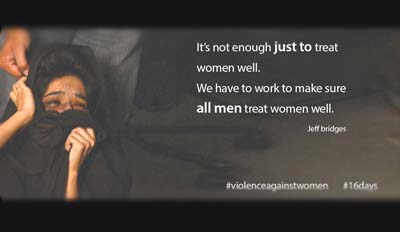The aficionado who felt at home in prisons
By Kaukab Tahir Shairani
4 May 2016
KARACHI: Living a mundane life in a prison in Germany, Nida shut herself from the outside world, ate whatever was served, and socialized with other prisoners. But she was not a prisoner.“Prisons are a monocosm of every nation,” said Nida. With an unplanned entry into law school at LUMS, she became deeply interested in human rights. She started working for the less privileged right from her college days. “During college, I had been into various unpredictable situations. This way, my family knew that I would not remain confined once I graduated,” she said. Indeed, Nida was seen visiting prisons, the ever famous red light called Heera Mandi and all those areas of the iconic Lahore that women would not dare to go to go alone. One such place was the vicinity of the Badshahi mosque.
Also known as Nida P by her peers, she went as far as living with the transgender community in Lahore to conduct a study during her junior year at LUMS. It is rare for a woman in a patriarchal society to be gutsy enough to walk into situations where she is potentially exposed to trouble. “I was not scared, or uncomfortable, maybe because I did not think so much. I just did what came my way,” she said.
For an average height and a very feminine, petite physique, Nida is really bold to tackle any kind of problem might occur. She was not scared; neither did she appear as though she was. Zoha Ghani, a peer of hers at college exclaimed, “Nida P! She is a gangster, nothing scares her.”
Coming from an upper-middle class Pakistani family, she grew up in an environment conducive to a woman’s education. She thrived in her field with guidance from teachers and strong parental support. A lot of her peers and co-workers believe that she is a person driven by her passions, and dreams.
Nida’s interest in the social and human rights affairs in Pakistan was apparent since her university days. After completing her law degree at LUMS in 2009, Nida moved back to Karachi and joined the Legal Aid Office.
However, joining the Legal Aid Office was her first step into professional life. She narrates her journey in and out of the court fondly. Her first experience of being before the judge was not frightening; she was just a bit cautious. Unlike most fresh graduates, Nida argued her cases before the judge herself. This interaction, she says, was a bridge between her and her clients. Most of her clients belonged to the lower class, and her service intrigued many notables in this profession because it was not so often that well-kept, fluent in English, young women would come up and translate their understanding of the legal system into Urdu while communicating with the judge. Not many would go through the trouble—they believed. “Perhaps the toughest part of starting off as an associate was to speak in Urdu with the judge. Other than that, I did not feel afraid,” she affirmed.
The young lawyer keenly followed Pakistan’s current affairs. Most of her decisions in life have been defined by what and how she feels about her country. “My first step into a prison was comfortable. I felt at home. No, I was not scared,” she says. To her, prisons are another world; they are a monocosm of every society. Slowly understanding prison systems, she became more willing to learn about them. Nida attributes most of her personality grooming to the shift in her psychology that impacted her due to her work. “I was mugged before and after I had seen prisons. Both the times, my reaction was vastly different,” she became calmer as she said. Nida is an outgoing, fun loving individual, and did not usually allow her work routine affect her personal life. But the aftermath of being with prisoners and interacting with them affected her gravely. She started to feel that she was not doing enough to help her clients. Soon, it became painful to see juveniles being dragged to courts. She felt responsible; she believes that the entire nation is to blame for this falling out.
Pakistan’s current affairs and social security situation has been at a constant ebb since the last decade or more. In a world where countries go to war at the drop of a hat, all in the name of security, most Pakistanis do not even have the basic necessities of food, clothing and shelter. Therefore, the juveniles that Nida met in prisons were more content with being in imprisonment. One of them told her that they feel in place at jail; at least there is a bed, and designated timings for meals. Unlike the common perception about prisons, these children did not want to leave this place for most of their basic necessities were being fulfilled here than being free to roam in the outside world. This was deplorable, and it made Nida upset. Due to these reasons, she often felt that she was working towards a lost cause. This was the onset of Nida wanting to completely reform the prison system in Pakistan. To achieve the same, in 2012 Nida availed a scholarship by the German Consulate of Foreign Affairs in Pakistan and moved to Germany to study the prison systems there only to bring back her findings to her home country. Both her and her peers consider this to be her most prominent move in terms of prison reformation whereby she disguised herself as a prisoner for four months and stayed among them. So much so, that even after the study was over, some of her fellow prisoners wrote to her. She values their affection and keeps in touch with them.
She believes that Pakistan has fierce potential to rise, and lawyers as a body have the ability to take it there. She also completed a Master’s Degree in Law from The Fletcher School at Tufts University in the United States. Upon her return to Pakistan in June 2015, she started her own consultancy. She has signed various cases helping juveniles in rural areas, and now looks forward to going to rural areas and exploring prisons there. She is constantly studying prison systems, and is on her way to introducing some major reforms to better Pakistani jails.
The prison aficionado now teaches as adjunct faculty at Indus Valley School in Karachi and is writing a chapter on judicial crises in Pakistan for a contemporary publication. Nida has a dream of reforming the prison system in Pakistan, but she believes that this change is collateral to other reforms in our society that need to be implemented, such as education be made accessible to all, reducing unemployment, providing people with health facilities and a place to live.








